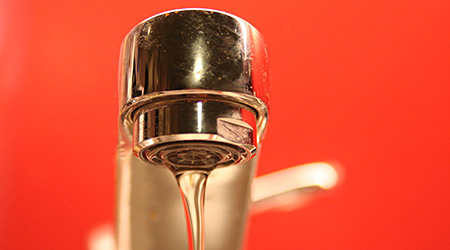How To Save On Water Bills

An increasing population and agriculture as well as dramatic environmental shifts resulting in droughts put serious strains on domestic water supplies. In the past you could go down to a local stream or dig a moderately shallow well to get water for you and your family. However, with increased usage, aquifers are getting depleted and water tables are lowering while rivers and streams are being diverted more and more for crops. As a result water utility costs have increased recently and are likely to continue increasing over the coming decades. Implementing changes now to curb water use and to use current supplies more efficiently can go a long way to saving money while securing water for everyone. Here are some tips to help save on your water bill.
Tip #1 - Stop the Leaks
Leaks tend to be the silent waster of water for residential and commercial buildings. Worn-out water fixtures and exterior water connections can degrade with time and use leading to small leaks that may go unnoticed for months or years. While not as bad as flooding a basement, small leaks have the aggregate effect of adding hundreds of dollars to a water bill over the course of a year. If you are uncomfortable fixing them yourself call a licensed professional plumber to expedite repairs.
Tip #2 - Use Less Water
Water usage is another area where utility bills can be slashed dramatically with a little attention and effort. Try to keep showers short duration ideally in the 10 to 15 minute range. Don't leave water running while brushing your teeth or washing the car. Only run the dishwasher and clothes washer when you have a full load. If you live in the Southwest, convert your existing landscaping to xeriscape and drought tolerant plants. If you have a lawn be sure to water at optimal times which are before 5:00 AM in the morning and after 7:00 PM at night to minimize evaporation. These and additional techniques require minor modifications of behavior but can dramatically alter how much water is used each month.
Tip #3 - Keep Pipes Clean
Water from a city resource or well should have a consistent color, smell and taste. If your water supply has a strange odor or a brownish color be sure to contact the water authority to investigate the cause. Often sand and clay will infiltrate the piping system causing sediment to build up. This can result in leaks in pipes leading to the house which the homeowner will be paying extra for as well as possibly contaminating the water. While not an area of extreme concern it still can be a waste of money and lead to other issues such as foundation damage or sinkholes.
Summary
Right now water bills for most residential and commercial users are still fairly inexpensive but the time is coming where costs could increase dramatically. Most water utilities charge based on usage so it's smart to use less water if it only means minor modifications to consumer behavior. Water is one of the most precious and valuable resources we have available and anything we can do today to use it more efficiently will only serve to benefit current and future generations.







